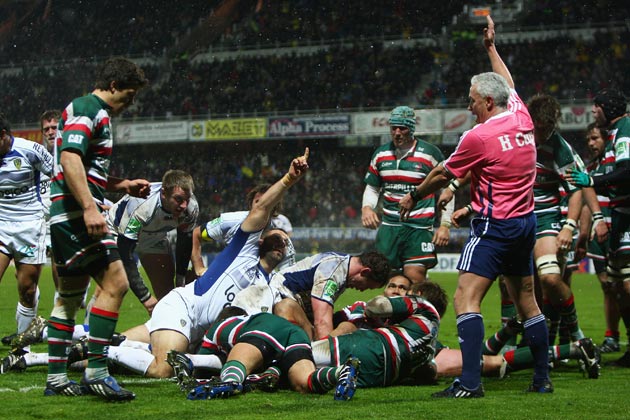Peter Bills: Referees shouldn't have to explain the rules of rugby

In Irish sporting circles, Alan Lewis is more famous as the wielder of willow than the blowing of whistles.
The 45 year-old Ireland rugby referee enjoyed a hugely successful career as a cricketer in his sports playing days. In fact, he is Irish cricket's most capped player, making 122 appearances between 1984 and 1997. So successful was he, he scored over 3000 runs and took more than 50 wickets, following in the line of his father Ian as a very decent cricket all-rounder. He only really took up rugby refereeing when forced by injury to give up cricket back in 1997.
Now the reason that Lewis is the topic of conversation in rugby circles this week is not because of his cricket exploits. Instead, one single blast from Lewis's whistle in the Heineken Cup match at the weekend in France between Clermont-Auvergne and Leicester Tigers reminded us that there is a way of solving many of rugby's current difficulties.
It wasn't because Lewis talked tough beforehand about how he was going to handle the breakdown. It wasn't because players were scared of his lurid pink shirt, although you could understand that if it were the case. Honestly, which couturier dresses these people?
No, it was because he penalised them at just about the very first ruck in that match. The moment Leicester flopped onto the wrong side of the ball, Lewis acted. No weasel words, as is so often the case with weaker officials, such as 'Hands away white, hands away please' or 'No. 6, out of there please'. When did they bring in a law that says rugby referees have to explain the law to players first on the field of play before they are allowed to penalise them? I obviously missed that.
The best referees do not carry on a running commentary with players on how to play the game. It's pathetic to hear some of the lesser ones doing so. Nigel Owens of Wales is awful in that respect.
I noticed, too, that Alan Lewis was tough on several occasions early on. Now bearing that in mind, was it therefore a complete coincidence that we saw in that one game more fast, recycled second phase possession, real quality ball than some teams have managed in half a dozen matches this season?
And if you still can't connect the two, ask yourself an even simpler question. Was it also an absolute coincidence that eight tries were scored in that match, most of them because of the quality of possession extracted from the breakdown?
Even a fool could surely see that Lewis's tough approach at the start of the game paid dividends in the type of game that developed. Leicester aren't fools, they're past masters at slowing down the opposition's ball at the breakdown. But they also knew that Lewis would have waved yellow cards at them had they continued to transgress and delay the loose ball. They know the man and they know he's hard. After all, their whole back row of Lewis Moody, Craig Newby and Jordan Crane has played international rugby. They know the score.
Yet the key to 70 points and eight tries being scored in what was a match of fantastic movement and entertainment was the rapid second phase ball.
Now you have to ask yourself another question. Why the hell don't all referees adopt the Alan Lewis philosophy of cracking down hard at the breakdown right from the start and making it clear that any such transgressions will result in yellow cards? The answer is, the standard of refereeing in competitions like the Heineken Cup is too often weak.
Take the example of the English official Wayne Barnes, a man who appears to strut the stage and dominate it rather than try and make himself largely anonymous, which was always the ultimate ambition for the very best referees in the game.
Barnes is the man whose crass error in allowing a blatant forward pass cost New Zealand their 2007 World Cup hopes. OK, that can happen – after all, Alan Lewis missed a clear one that led directly to a Leicester try at Clermont.
But last Friday night in Munster, Barnes and his officials missed a clear offside from a kick downfield and when Perpignan were subsequently penalised at that breakdown, Ronan O'Gara kicked the goal. Given that the final result was Munster 24 Perpignan 23, you could say that mistake by Barnes cost the Frenchmen the match. He also made a very marginal decision for offside from which O'Gara kicked another penalty.
I understand the philosophy of the refereeing brigade. Why should they be the people that have to save the game? Why won't coaches be more positive rather than continually preaching negativity and killing the ball as often as possible?
It's a view but if the power is in the hands of the match referee to sort out this nonsense that has impacted so badly on the game as a spectacle, surely, like Lewis, he should use it?
Subscribe to Independent Premium to bookmark this article
Want to bookmark your favourite articles and stories to read or reference later? Start your Independent Premium subscription today.

Join our commenting forum
Join thought-provoking conversations, follow other Independent readers and see their replies